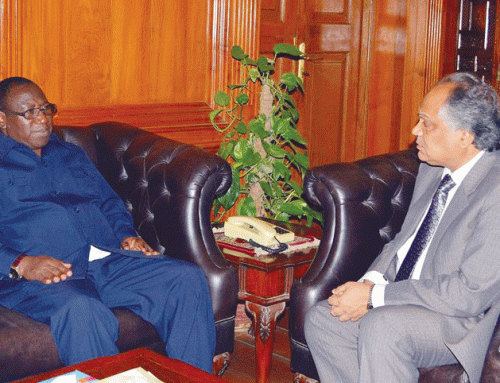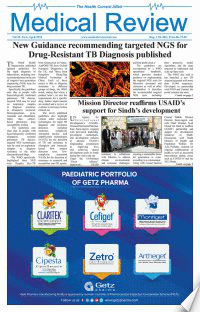Nuclear Medicine & Oncology Division, Pakistan Atomic Energy Commission, Islamabad
A Beacon of Hope for Cancer Patients
Mr. Muhammad Naeem (HI, SI)
Chairman PAEC
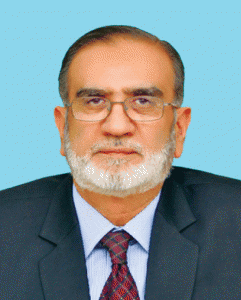 PAEC Cancer hospitals are extending their services for the management of cancer patients throughout the country. There are Eighteen hospitals at the moment throughout Pakistan. PAEC is committed to provide the best possible treatment according to national and international standards to patients suffering from cancer. PAEC hospitals are equipped with latest equipment for providing diagnostic and therapeutic services under the supervision of highly qualified and experienced doctors, physicists, scientists, technologists, nurses and paramedical staff. PAEC medical centers are progressing at a rapid pace. The number of patients being treated annually is about eight hundred thousand and is increasing day by day.
PAEC Cancer hospitals are extending their services for the management of cancer patients throughout the country. There are Eighteen hospitals at the moment throughout Pakistan. PAEC is committed to provide the best possible treatment according to national and international standards to patients suffering from cancer. PAEC hospitals are equipped with latest equipment for providing diagnostic and therapeutic services under the supervision of highly qualified and experienced doctors, physicists, scientists, technologists, nurses and paramedical staff. PAEC medical centers are progressing at a rapid pace. The number of patients being treated annually is about eight hundred thousand and is increasing day by day.
Dr. S. M. Javed Akhtar (POP)
Member Science (PAEC)
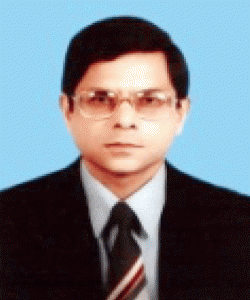 One of the most important peaceful uses of Nuclear energy is in the field of medicine. Considering this fact, PAEC is engaged in treating cancer patients from all over the country through its dedicated medical centers. PAEC is proud of treating a large majority of suffering humanity, not only from Pakistan but also from other countries. Besides, providing treatment to already diagnosed patients, these hospitals are also offering screening services for early detection of the disease and hence timely treatment which is prerequisite for cancer cure and good quality of life.
One of the most important peaceful uses of Nuclear energy is in the field of medicine. Considering this fact, PAEC is engaged in treating cancer patients from all over the country through its dedicated medical centers. PAEC is proud of treating a large majority of suffering humanity, not only from Pakistan but also from other countries. Besides, providing treatment to already diagnosed patients, these hospitals are also offering screening services for early detection of the disease and hence timely treatment which is prerequisite for cancer cure and good quality of life.
Dr. Fayyaz Ahmed
Director Medical Sciences (PAEC)
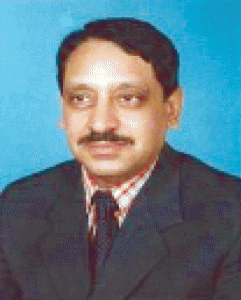 PAEC has over the years, built many advanced Nuclear Medicine and Oncology Hospitals, catering to a large population of Pakistan and also providing free cancer care to poor and deserving patients. In most of the PAEC cancer hospitals, both the diagnostic and therapeutic facilities are available under one roof. These hospitals are also playing active role in increasing awareness among public and health care providers about cancer, risk factors, healthy life style and trying to alleviate myths and misconceptions about this deadly disease. In these hospitals, treatment to the cancer patients is not denied whatever the stage of disease and age of patient.
PAEC has over the years, built many advanced Nuclear Medicine and Oncology Hospitals, catering to a large population of Pakistan and also providing free cancer care to poor and deserving patients. In most of the PAEC cancer hospitals, both the diagnostic and therapeutic facilities are available under one roof. These hospitals are also playing active role in increasing awareness among public and health care providers about cancer, risk factors, healthy life style and trying to alleviate myths and misconceptions about this deadly disease. In these hospitals, treatment to the cancer patients is not denied whatever the stage of disease and age of patient.
Nuclear Medicine & Oncology Division, Pakistan Atomic Energy Commission, Islamabad
A Beacon of Hope for Cancer Patients
Soon after the creation of Pakistan Atomic Energy Commission (PAEC), major emphasis was given to the peaceful use of atomic energy and nuclear applications. Therefore, a program for establishment of cancer hospitals and agriculture institutes was started in early sixties. So far eighteen cancer hospitals equipped with state-of-the-art equipment are working under the supervision of qualified, trained and experienced personnel. These hospitals are ‘not for profit’ organizations and charge at subsidized rates from affordable patients only. Regular budget to meet operational, research & development expenditures of these hospitals is provided by Government of Pakistan while Federal Ministry of Zakat and Ushar is also providing funds for the welfare of needy cancer patients including free of cost medicine. Patients from all over Pakistan and other neighboring countries are also getting treatment facilities from these hospitals.
First public sector Positron Emission Tomo-graphy and Computerized Tomography (PET-CT) & Cyclotron facility added in nuclear medicine department at Institute of Nuclear Medicine & Oncology Lahore (INMOL). Various routine diagnostic procedures performed in nuclear medicine department are Cardiac/ MUGA, Thyroid/ Parathyroid, Bone, Renal, Hepatobilliary Scanning, Meckel’s & GIT Bleeding Studies, Lympho-scintigraphy, Sentinel Node Imaging and GFR Assessment. While, the routine therapeutic procedures/facilities in oncology departments include treatment of Thyroid Cancer, Benign Thyroid Disorders, Bone Pain Palliation, Radiation Synovectomy, MIBG therapy for neuro-endocrine tumors (NETs) and various type of radiation therapy includ-ing latest modern techniques such as IMRT, IGRT etc.
Oncology departments established at these hospitals are also well equipped with state-of-the-art radiation therapy equipment like LINACs, Cobalt-60 Teletherapy, Remote after Loading Brachytherapy, Simulators (Digital/CT), Treatment Planning Systems, Moulds, dosimetry/all medical physics facilities. These hospitals also have 50-100 bedded wards (male and female), separate pediatric & daycare chemotherapy bays and isolation & dedicated rooms for neutropenia patients & for I-131 therapy for thyroid ablation (hyperthyroidism & thyroid carcinoma). OPDs include filter, breast & thyroid clinics.
Radiology department comprises of routine X-rays, CT Scanning, Mammography, Ultrasound, DEXA Units. While clinical labs includes Radio-Immuno-assay, Hematology & Biochemistry for routine diagnostic facility and PCR for Hepatitis B & C & Dengue Screening, Molecular Diagnostic & Research facilities etc.
Quality control and assurance is given prime importance to meet the international standards and these hospitals are accredited with ISO certification. Nuclear Medicine, Oncology & Radiotherapy, Institute (NORI), Islamabad declared the first in Pakistan and third in Asia as a “Quality Assurance in Nuclear Medicine (QUANUM) Certified Institute” by IAEA. Institute of Nuclear Medicine & Oncology Lahore (INMOL) declared as Centre of Excellence for PET-CT & Cyclotron Studies by European
Nuclear Association. Karachi Institute of Radiotherapy and Nuclear Medicine (KIRAN) and Atomic Energy Medical Centre (AEMC), Karachi are also recognized as Centre of Excellence by IAEA.
According to PAEC cancer registry, the number of new cancer patients registered has grown from 22,754 in 2009 to 34,078 in 2014 showing 49.7% increase in new cancer patients. Head & Neck (H&N) in male while Breast in female are recorded as top most cancers. To address the need of cancer patients, PAEC has equipped all hospitals with Breast Cancer Clinics and also established Mobile Breast Care Clinics (MBCC) at Institute of Nuclear Medicine and Oncology Lahore (INMOL), Bahawalpur Institute of Nuclear Medicine and Oncology (BINO) and Nuclear Institute of Medical Radiotherapy (NIMRA) Jamshoro. Fortnightly visits and camps are arranged by these hospitals in remote areas to provide free screening facilities to the patients and awareness brochures are also distributed among general public.
 The month of October every year is observed as Breast Cancer Awareness Month at all hospitals by holding walks, delivering lectures, hanging banners, distributing informative brochures, organizing seminars and conferences. October 25, further is recognized and observed as Mammogram Day at all hospitals and free breast examination, ultrasonography and mammography facilities are provided to women. In
The month of October every year is observed as Breast Cancer Awareness Month at all hospitals by holding walks, delivering lectures, hanging banners, distributing informative brochures, organizing seminars and conferences. October 25, further is recognized and observed as Mammogram Day at all hospitals and free breast examination, ultrasonography and mammography facilities are provided to women. In
addition to Breast Cancer Awareness Campaign, World Cancer Day is also observed, on February 4, in collaboration with professional medical associations, national public service orga-nizations and government agencies partnering and binding together to raise awareness about cancer, share information about the disease, and provide greater access to the services.
These hospitals are also engaged in building human resource with collaboration of Pakistan Institute of Engineering and Applied Sciences (PIEAS) Islamabad, College of Physician and Surgeon Pakistan (CPSP) and other medical universities in the fields of nuclear medicine, radiation & medical oncology, radiology and medical/health physics.
Atomic Energy Cancer Hospitals (AECHs) and Capital Administration and Development Division (CADD), Government of Pakistan are major counterparts in International Atomic Energy Agency (IAEA) Programme of Action for Cancer Therapy (PACT). Expert teams are working in close collaboration with the World Health Organization (Eastern Mediterranean Regional Office) and the International Agency for Research on Cancer. Both organizations are partners in the IAEA activities to assess and strengthen Pakistan’s cancer control capabilities, Pakistan National Cancer Registry and formation of National and Provincial Steering Committees to launch cancer control plan.
Cancer Patients Welfare Societies (CPWS) regis-tered with the Ministry of Social Welfare and Zakat & Ushar are functioning under the supervision of renowned philanthropists at Atomic Energy Cancer Hospitals to provide support to poor patients for their treatment. All sorts of charities like Sadqa, Khairat, Zakat, Ushar received from general public is utilized to provide help to poor patients. Pharmacies are also working under CPWS to provide free of cost medicines including expensive cytotoxic/ chemothera-peutic drugs to deserving patients.


